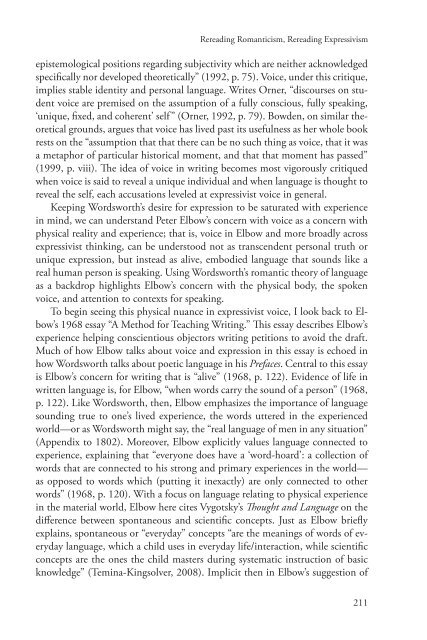Critical Expressivism- Theory and Practice in the Composition Classroom, 2014a
Critical Expressivism- Theory and Practice in the Composition Classroom, 2014a
Critical Expressivism- Theory and Practice in the Composition Classroom, 2014a
You also want an ePaper? Increase the reach of your titles
YUMPU automatically turns print PDFs into web optimized ePapers that Google loves.
Reread<strong>in</strong>g Romanticism, Reread<strong>in</strong>g <strong>Expressivism</strong><br />
epistemological positions regard<strong>in</strong>g subjectivity which are nei<strong>the</strong>r acknowledged<br />
specifically nor developed <strong>the</strong>oretically” (1992, p. 75). Voice, under this critique,<br />
implies stable identity <strong>and</strong> personal language. Writes Orner, “discourses on student<br />
voice are premised on <strong>the</strong> assumption of a fully conscious, fully speak<strong>in</strong>g,<br />
‘unique, fixed, <strong>and</strong> coherent’ self” (Orner, 1992, p. 79). Bowden, on similar <strong>the</strong>oretical<br />
grounds, argues that voice has lived past its usefulness as her whole book<br />
rests on <strong>the</strong> “assumption that that <strong>the</strong>re can be no such th<strong>in</strong>g as voice, that it was<br />
a metaphor of particular historical moment, <strong>and</strong> that that moment has passed”<br />
(1999, p. viii). The idea of voice <strong>in</strong> writ<strong>in</strong>g becomes most vigorously critiqued<br />
when voice is said to reveal a unique <strong>in</strong>dividual <strong>and</strong> when language is thought to<br />
reveal <strong>the</strong> self, each accusations leveled at expressivist voice <strong>in</strong> general.<br />
Keep<strong>in</strong>g Wordsworth’s desire for expression to be saturated with experience<br />
<strong>in</strong> m<strong>in</strong>d, we can underst<strong>and</strong> Peter Elbow’s concern with voice as a concern with<br />
physical reality <strong>and</strong> experience; that is, voice <strong>in</strong> Elbow <strong>and</strong> more broadly across<br />
expressivist th<strong>in</strong>k<strong>in</strong>g, can be understood not as transcendent personal truth or<br />
unique expression, but <strong>in</strong>stead as alive, embodied language that sounds like a<br />
real human person is speak<strong>in</strong>g. Us<strong>in</strong>g Wordsworth’s romantic <strong>the</strong>ory of language<br />
as a backdrop highlights Elbow’s concern with <strong>the</strong> physical body, <strong>the</strong> spoken<br />
voice, <strong>and</strong> attention to contexts for speak<strong>in</strong>g.<br />
To beg<strong>in</strong> see<strong>in</strong>g this physical nuance <strong>in</strong> expressivist voice, I look back to Elbow’s<br />
1968 essay “A Method for Teach<strong>in</strong>g Writ<strong>in</strong>g.” This essay describes Elbow’s<br />
experience help<strong>in</strong>g conscientious objectors writ<strong>in</strong>g petitions to avoid <strong>the</strong> draft.<br />
Much of how Elbow talks about voice <strong>and</strong> expression <strong>in</strong> this essay is echoed <strong>in</strong><br />
how Wordsworth talks about poetic language <strong>in</strong> his Prefaces. Central to this essay<br />
is Elbow’s concern for writ<strong>in</strong>g that is “alive” (1968, p. 122). Evidence of life <strong>in</strong><br />
written language is, for Elbow, “when words carry <strong>the</strong> sound of a person” (1968,<br />
p. 122). Like Wordsworth, <strong>the</strong>n, Elbow emphasizes <strong>the</strong> importance of language<br />
sound<strong>in</strong>g true to one’s lived experience, <strong>the</strong> words uttered <strong>in</strong> <strong>the</strong> experienced<br />
world—or as Wordsworth might say, <strong>the</strong> “real language of men <strong>in</strong> any situation”<br />
(Appendix to 1802). Moreover, Elbow explicitly values language connected to<br />
experience, expla<strong>in</strong><strong>in</strong>g that “everyone does have a ‘word-hoard’: a collection of<br />
words that are connected to his strong <strong>and</strong> primary experiences <strong>in</strong> <strong>the</strong> world—<br />
as opposed to words which (putt<strong>in</strong>g it <strong>in</strong>exactly) are only connected to o<strong>the</strong>r<br />
words” (1968, p. 120). With a focus on language relat<strong>in</strong>g to physical experience<br />
<strong>in</strong> <strong>the</strong> material world, Elbow here cites Vygotsky’s Thought <strong>and</strong> Language on <strong>the</strong><br />
difference between spontaneous <strong>and</strong> scientific concepts. Just as Elbow briefly<br />
expla<strong>in</strong>s, spontaneous or “everyday” concepts “are <strong>the</strong> mean<strong>in</strong>gs of words of everyday<br />
language, which a child uses <strong>in</strong> everyday life/<strong>in</strong>teraction, while scientific<br />
concepts are <strong>the</strong> ones <strong>the</strong> child masters dur<strong>in</strong>g systematic <strong>in</strong>struction of basic<br />
knowledge” (Tem<strong>in</strong>a-K<strong>in</strong>gsolver, 2008). Implicit <strong>the</strong>n <strong>in</strong> Elbow’s suggestion of<br />
211


















